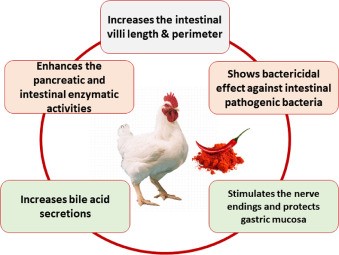USE OF PHYTOCHEMICALS AS ANTIMICROBIAL GROWTH PERFORMANCE PROMOTERS (AGPs) IN POULTRY FEED
Phytochemical which is naturally available to us at very low cost,But even though we don’t pay much attention, phytochemical sources are a rich source of antioxidant, antibacterial, and antiviral properties,Some phytochemicals known to us or used in our tradition since long.
If we use these phytochemicals sensibly, we are using agp for regular and course which causes huge loss to us financially after some time. Due to development of resistance in the form.Everyone knows this story from us, most of the people also agree on it, but The main reason for not paying proper attention to it is either we do not want to know about it and may be our nutrition science is underconfident for its farm application because its commercial marketing is less and negligible while there is a lot of research on this phytochemical. have more research references
But still feed nutrition is being done according to genetic manual guide which is good for reference but in field feed formulation or poultry nutrition total depends
- Type of Farming (Open and Close House)
- Local raw materials which are very cheap and available according to the season
But the biggest problem of using them is to accept its importance, if we use these local resources with proper nutrition information, then we can make growth in performance, production, mortality control and economic feed cost.But still most of the feed formulation farmers and integrators Protein, Energy Minerals, Vitamin Premix and AGP do as per genetic manual while other additives As probiotic,Prebiotics, Phytochemicals still use psychologically,
Presently during my travel in some states of India I found that old farm or new isolated farm (50 to 60 km no field) a trend is being followed blindly monthly course in layer bird and in broiler from day one Anti mycoplasma medicine is being used instead of treating the root cause.
As a result knowingly or unknowingly every farmer and integrator is in the cycle of treatment and medicine.
The reality is this is the main reason for any respiratory disease other than farm management.
- Feed DEB is imbalanced, which acts on cellular immunity
- Other micronutrients such as vitamins and minerals that normally change in feed requirements as the raw materials in the feed change, which are generally ignored because only protein and energy are added to feed formulations. materials are considered to result in deficiency of these micronutrients leading to problems of metabolic diseases and immunity challenges.
- Feed Toxicity
(Generally people worry about aflatoxin, when in reality apart from aflatoxin, four other toxins are also present in feed toxins which combined have more effect) ,Which is directly related to immunity vaccination titer.
- Need to maintain ND and IB titer as weather change or in trans phase which is directly related to mycoplasma and other respiratory disease, it has been observed
- Spray 12 hours after vaccination for 3 days after vaccination with ND and IB essential oils like Broncovest
It has a greater effect in increasing the titer of ND and Ib, also reduces the respiratory gurgling sound effect in poultry birds that can be experienced in most farms after Tor pe lasota vaccine.
- Including chilli in feed which has high antioxidant content, Vitamin A which is very useful for egg yolk color, works as a panacea in respiratory diseases like LPAI and HPAI.
Terpenoids, which are abundant in chillies, research has also shown that Chilli is very useful in increasing ND titer, besides it is proven fact for antibacterial, antiviral, it is easily available very cheap nowadays.
conclusion:
Phytochemical use in feed water acidifier locally available resources along with prebiotics , Probiotics water acidifier Phytochemical such as
- Chilli – High antioxidants vitamin A & vitamin C good for respiratory disease & fibroid , cystic ovary
- Garlic – antimicrobial good for respiratory disease
- Tamarind is good for liver
- Turmeric antimicrobial good for gut health
- Tulsi (Ocimum) good in respiratory & reproductive disease because of high antioxidants for spray which is normally good for respiratory disease
1.. Menthol
- Eucalyptus
- Cinnamon
Reasonably economical & sensible nutrition science otherwise cycle of AGP and treatment cycles are waiting for all of us. Do discuss with your nutritionist to use prebiotic, probiotics, phytochemical (locally available) appropriately.
Dr. Bhaskar Chowdhary
(Animal Nutritionist)



